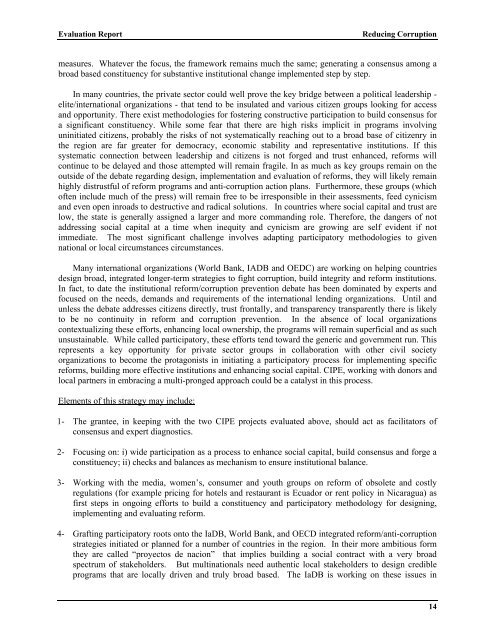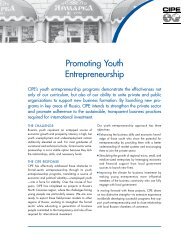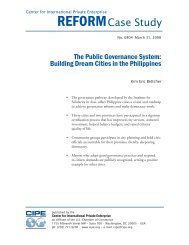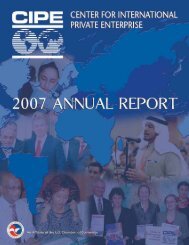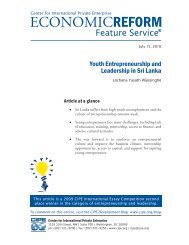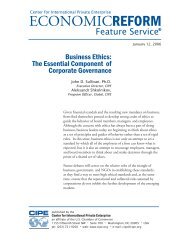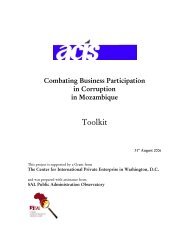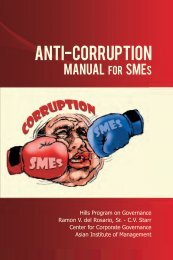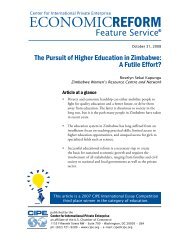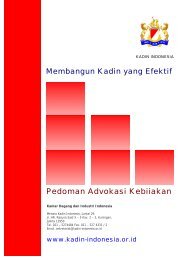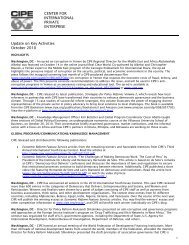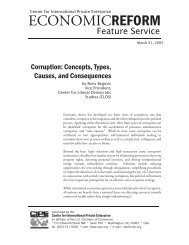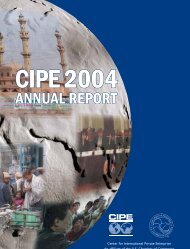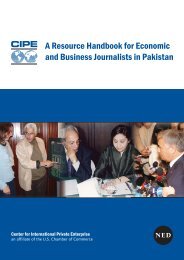REDUCING CORRUPTION A Report on Two Anti-Corruption Projects
REDUCING CORRUPTION A Report on Two Anti-Corruption Projects
REDUCING CORRUPTION A Report on Two Anti-Corruption Projects
Create successful ePaper yourself
Turn your PDF publications into a flip-book with our unique Google optimized e-Paper software.
Evaluati<strong>on</strong> <str<strong>on</strong>g>Report</str<strong>on</strong>g>Reducing Corrupti<strong>on</strong>measures. Whatever the focus, the framework remains much the same; generating a c<strong>on</strong>sensus am<strong>on</strong>g abroad based c<strong>on</strong>stituency for substantive instituti<strong>on</strong>al change implemented step by step.In many countries, the private sector could well prove the key bridge between a political leadership -elite/internati<strong>on</strong>al organizati<strong>on</strong>s - that tend to be insulated and various citizen groups looking for accessand opportunity. There exist methodologies for fostering c<strong>on</strong>structive participati<strong>on</strong> to build c<strong>on</strong>sensus fora significant c<strong>on</strong>stituency. While some fear that there are high risks implicit in programs involvinguninitiated citizens, probably the risks of not systematically reaching out to a broad base of citizenry inthe regi<strong>on</strong> are far greater for democracy, ec<strong>on</strong>omic stability and representative instituti<strong>on</strong>s. If thissystematic c<strong>on</strong>necti<strong>on</strong> between leadership and citizens is not forged and trust enhanced, reforms willc<strong>on</strong>tinue to be delayed and those attempted will remain fragile. In as much as key groups remain <strong>on</strong> theoutside of the debate regarding design, implementati<strong>on</strong> and evaluati<strong>on</strong> of reforms, they will likely remainhighly distrustful of reform programs and anti-corrupti<strong>on</strong> acti<strong>on</strong> plans. Furthermore, these groups (whichoften include much of the press) will remain free to be irresp<strong>on</strong>sible in their assessments, feed cynicismand even open inroads to destructive and radical soluti<strong>on</strong>s. In countries where social capital and trust arelow, the state is generally assigned a larger and more commanding role. Therefore, the dangers of notaddressing social capital at a time when inequity and cynicism are growing are self evident if notimmediate. The most significant challenge involves adapting participatory methodologies to givennati<strong>on</strong>al or local circumstances circumstances.Many internati<strong>on</strong>al organizati<strong>on</strong>s (World Bank, IADB and OEDC) are working <strong>on</strong> helping countriesdesign broad, integrated l<strong>on</strong>ger-term strategies to fight corrupti<strong>on</strong>, build integrity and reform instituti<strong>on</strong>s.In fact, to date the instituti<strong>on</strong>al reform/corrupti<strong>on</strong> preventi<strong>on</strong> debate has been dominated by experts andfocused <strong>on</strong> the needs, demands and requirements of the internati<strong>on</strong>al lending organizati<strong>on</strong>s. Until andunless the debate addresses citizens directly, trust fr<strong>on</strong>tally, and transparency transparently there is likelyto be no c<strong>on</strong>tinuity in reform and corrupti<strong>on</strong> preventi<strong>on</strong>. In the absence of local organizati<strong>on</strong>sc<strong>on</strong>textualizing these efforts, enhancing local ownership, the programs will remain superficial and as suchunsustainable. While called participatory, these efforts tend toward the generic and government run. Thisrepresents a key opportunity for private sector groups in collaborati<strong>on</strong> with other civil societyorganizati<strong>on</strong>s to become the protag<strong>on</strong>ists in initiating a participatory process for implementing specificreforms, building more effective instituti<strong>on</strong>s and enhancing social capital. CIPE, working with d<strong>on</strong>ors andlocal partners in embracing a multi-pr<strong>on</strong>ged approach could be a catalyst in this process.Elements of this strategy may include:1- The grantee, in keeping with the two CIPE projects evaluated above, should act as facilitators ofc<strong>on</strong>sensus and expert diagnostics.2- Focusing <strong>on</strong>: i) wide participati<strong>on</strong> as a process to enhance social capital, build c<strong>on</strong>sensus and forge ac<strong>on</strong>stituency; ii) checks and balances as mechanism to ensure instituti<strong>on</strong>al balance.3- Working with the media, women’s, c<strong>on</strong>sumer and youth groups <strong>on</strong> reform of obsolete and costlyregulati<strong>on</strong>s (for example pricing for hotels and restaurant is Ecuador or rent policy in Nicaragua) asfirst steps in <strong>on</strong>going efforts to build a c<strong>on</strong>stituency and participatory methodology for designing,implementing and evaluating reform.4- Grafting participatory roots <strong>on</strong>to the IaDB, World Bank, and OECD integrated reform/anti-corrupti<strong>on</strong>strategies initiated or planned for a number of countries in the regi<strong>on</strong>. In their more ambitious formthey are called “proyectos de naci<strong>on</strong>” that implies building a social c<strong>on</strong>tract with a very broadspectrum of stakeholders. But multinati<strong>on</strong>als need authentic local stakeholders to design credibleprograms that are locally driven and truly broad based. The IaDB is working <strong>on</strong> these issues in14


